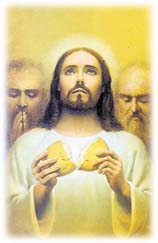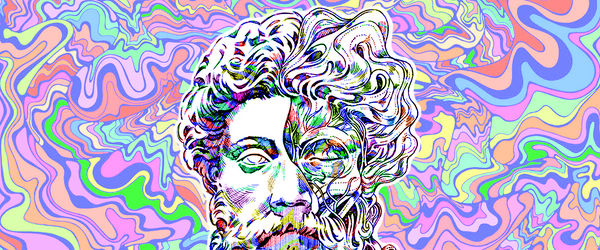Daniel Goldsmith • • 6 min read
Breaking Bread: 4 Easter Lessons You Won’t Learn in Church

“And their eyes were opened…”
Last Christmas, I put forward the idea that the birth of Christ was not some one time event in the distant past, but a continual possibility for everyone. I found this symbolic dimension of Christmas to be more affirming and empowering than the traditional narrative that there is only one son of God (and you’re not him). Now, with Easter having just passed, I’d like to open up a beautiful, empowering dimension of the resurrection story that has value regardless of your religious persuasion.
Like Christmas, there are many competing accounts in the gospels of what happened on Easter. These often contradict each other, which makes it impossible to hold any one particular gospel up as the truth of what ‘actually happened.’ (side note: The French writer Eric Emmanuel Schmitt says that we’re lucky to have four gospels that contradict each other- it forces us to think about them in a critical way). For my purposes here, I only want to focus on one version and unlock what it might have to teach us.
In Luke 24:13-35, we find the story of two disciples, distraught at the events that had just transpired in Jerusalem, walking to the nearby village of Emmaus. Jesus encounters these two (who were amazed that he hadn’t heard about what just happened) but they don’t recognize him. After they reach the village, the two disciples invite this stranger in to sit down and break bread together. Then, as Luke puts it, “their eyes were opened”, and Jesus disappears.
There are three points I’d like to investigate – and four lessons you can apply to your life right now.
1) “As they talked and discussed these things with each other, Jesus himself came up and walked along with them, but they were kept from recognizing him.” (Luke, 24:15-16)
Why don’t the disciples recognize Jesus? They probably had spent weeks or even years with him, so why didn’t they recognize their master when he appeared?
Because they didn’t expect to find him there.
In their minds, death was final; to suggest that Jesus would exist in some other way, or that the messianic redemption they so desperately hoped for could occur after Jesus’ death would have been crazy. But lo and behold, contrary to previous experience, he appeared. What’s more, Luke states that the disciples knew about the experience of the female disciples at the empty tomb. Doubt, ideas, and assumptions got in the way of seeing the reality in front of their eyes.
Lesson #1: The biggest obstacle to God is the idea of God.
We have all sorts of intellectual constructs about how and who and what God is, which may lead us to dismiss the experience right in front of our face simply because it does not live up to our idea of what we thought It/He/She would be.
Is it possible that we’ve walked with Christ and simply not recognized him/her? Is it possible that, in thinking God incarnates in human form only once, we’ve distracted ourselves from seeing how God manifests in our family and our neighbors?
It can sound a little new-agey or flakey to say that Christ is in everyone, but it’s really much much simple than it sounds. Seeing Christ in everyone means that you recognize that everyone you encounter has capacity to be loving, kind, generous, and unselfish. Like the Buddha with the mass murderer Angulimala, Jesus found that light even in the prostitutes and the tax collectors. And the more we begin to see it in others, the more others will begin to see it in ourselves.
2) “When he was at the table with them, he took bread, gave thanks, broke it and began to give it to them” (Luke 24:30)
Notice how it wasn’t some secret vision or an intellectual revelation, but a simple action of that lead the disciples to recognize the stranger.
Lesson #2: Actions speak louder than words.
All the talk about higher consciousness doesn’t amount to anything if we do not live it out. We put ourselves in line with the infinitely generous nature of the universe not by speculation or belonging to esoteric clubs, but by openly giving without fear. In sharing our resources and being hospitable to strangers, we awaken to the presence of God around us. In fact, we can only recognize Godliness through the way in which we interact with each other, since Christ consciousness is something that must be lived and embodied.
There’s also something to be said about the fact that a piece of bread catalyzed the disciples’ understanding. Bread is probably the most simple, commonplace food that you could think of, which everyone eats regardless of wealth and social status. And yet, look how much power it holds!

Jesus Christ, this bread is good!
Lesson #3: Godliness is all around us
Some people think they will find Godliness/holiness/Christ only in some realm beyond this world. But this story shows that it’s right here in the most mundane objects.
To awaken to that power, however, we’ll probably have to stop texting during our meals and sensitize ourselves to what’s going on when we share food with each other.
3) “Then their eyes were opened and they recognized him, and he disappeared from their sight. They asked each other, ‘Were not our hearts burning within us while he talked with us on the road and opened the Scriptures to us?’ They got up and returned at once to Jerusalem.” (Luke 24: 32-33)
It’s fair to assume that these disciples were leaving Jerusalem because, at least in part, they were afraid for their lives. With the crucifiction, all their hopes for messianic redemption had been dashed in the most ignominious way possible. And since anyone associated with Jesus might have been the next potential candidate for the cross, it was probably a good idea to get the hell out of there.
Through his life and death, Jesus communicated that it doesn’t matter how long you live. What are a few more years of earthly existence in comparison to the peace that emerges from the understanding that you are part of something eternal? It’s natural to cling to this earthly existence, to this particular mind/body form, but the real purpose of this human form is to give God the eyes to look out at Him/Herself. The importance of everything else pales in comparison to actualizing this understanding and living it out.
Jesus came to that understanding and did the best he could to open other people to it. He willingly acquiesced to whatever he could to to awaken other people to the limitless, infinite beauty of God, even if that meant giving up his own life as an example of perfect trust, surrender, and forgiveness.
Read: Think Long and Hard About Your Death if You Want to Live
And as long as you open up, just once in your life to this, you’ve ‘gotten it.’ A glimpse of this larger reality (which is actually present in each moment!) can completely change and reorient your priorities in life. The former self with which one has identified is dead, and a new one has risen in its place.
Lesson #4: Shift your perspective from the self to the cosmic whole/Serve something larger than your life
This seems to be what happened to the disciples. With Jesus’ breaking of the bread, something clicked. They experienced something so deep and profound that they rushed right back into what was surely a dangerous situation to share the good news. Their experience of godliness allowed them to overcome their fear, and gave them the strength, courage, and conviction to surrender their lives to serve the Truth, even if that meant death (which it did in for many of them).
To be sure, no matter how intense our realizations may be, they are bound to fade under the demands of everyday life. We may experience a moment or two of great trust, only to find it gone the next day. But that is all part of the game; the great play of revelation and concealment that is the universe. Any time we feel lost, cast out, and forlorn, the message of Emmaus is that we can re-contact the divinity in all things at any time, performing simple acts with simple objects.
So after these reflections, may YOU be open and receptive to see the face of God in everyone you see. May YOU experience the magic, the mystery, and the miracle of sharing food with others. And may the trust and peace that arises from understanding your true nature arise in YOU!


![Seneca’s Groundless Fears: 11 Stoic Principles for Overcoming Panic [Video]](/content/images/size/w600/wp-content/uploads/2020/04/seneca.png)







